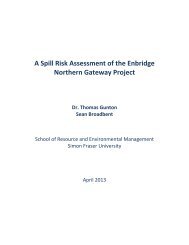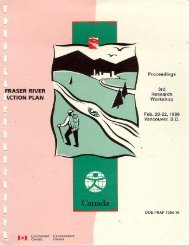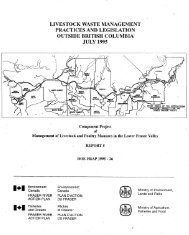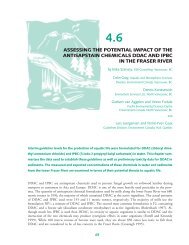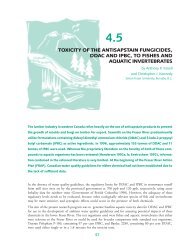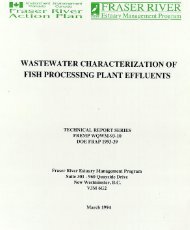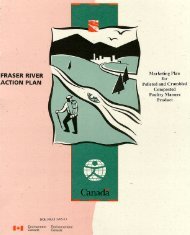9420.pdf
9420.pdf
9420.pdf
You also want an ePaper? Increase the reach of your titles
YUMPU automatically turns print PDFs into web optimized ePapers that Google loves.
expensive ones. Evaporators usually cannot concentrate beyond 60 % water and 40 %<br />
solids (Goldhor and Koppernaes, 1993). Evaporation is used in several clam plants to<br />
treat cookwater, resulting in clam broth or flavour concentrate (Goldhor and<br />
Koppernaes, 1993 ). Evaporation is normally considered to be far too costly for waste<br />
treatment, and is only used where a saleable product will be a result. (<br />
5.3.7 Summary of Treatment Processes in Use for Fish Processing Plant Effluents<br />
Of the end of pipe treatment technologies<br />
use at fish processing plants. Table 5.9<br />
treatment technologies currently in use at<br />
reviewed in this section, only a handful are in<br />
presents a summary of the known full scale<br />
fish processing plants.<br />
Table 5.9 Full Scale End-of-Pipe Treatment Technologies for Use at Fish<br />
Processing Plants<br />
Treatment Type Installations<br />
500 pm screening Large number of installations<br />
150 pm screening Very few installations<br />
Under 150 pm screening None in North America, some in Norway<br />
DAF without chemicals Installations in Europe<br />
DAF wtth chemicals Installations in Europe, one in North America<br />
Activated sludge (separate) One installation in Europe, several in Japan<br />
Activated sludge (combined) Several installations in Europe<br />
Lagoons (combined) One installation in BC<br />
5.4 Byproduct Recovery<br />
5.4.1 General<br />
Seafood processing operations generate a great deal of solid waste, much of it in the<br />
form of edible protein. Recovery of edible byproducts for human or animal feed is<br />
affected by the small scale and seasonality of many food processing facilities.<br />
74



